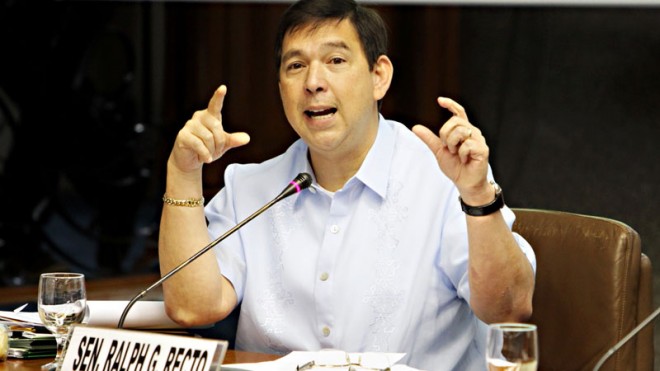Senator Ralph Recto has filed four “remedial measures” in the Senate that would place state lottery income “beyond the reach of the most powerful person in the land” by earmarking it for health.
Recto said his bills, which he said would “rationalize and depoliticize” the use of the Philippine Charity Sweepstakes Office (PCSO) income, sought the automatic remittance of the multi-billion-peso fund for the “purchase of medicines, improvement of hospitals and attainment of universal health care.”
“The idea is to transform the Charity Fund from a discretionary fund into a fund with a fixed beneficiary. If it is permanently consigned for a set of activities, then the temptation to tap it for other purpose, no matter how worthy, will be gone,” he said in a statement on Wednesday.
In Senate Bill 60, the senator seeks the earmarking of the PCSO Charity Fund for universal healthcare and improvement of PhilHealth’s benefit packages while the other bills propose that these should be used to upgrade public hospitals.
Recto, in a separate measure, defined the new regime in utilizing PCSO’s Charity Fund while respecting the existing revenue share of local government units and other government agencies.
The senator pointed out that under the law governing the PCSO, 55 percent of its gross income is set aside for prizes, 15 percent for operations and 30 percent for the Charity Fund. The latter, he said, reached P9.6 billion in 2015.
At present, he said, any disbursements from the Charity Fund must not only be authorized by the PCSO Board of Directors but must also be approved by the Office of the President.
Recto said that while the Charity Fund has indeed helped millions of Filipinos, accessing it still “requires the sick to queue for assistance in many PCSO offices.”
“PCSO becomes some sort of a medical panel, performing a kind of ‘triage’ which assigns how much help will be given to an applicant,” he said.
“This work is best left to hospitals which can equitably allocate the resources based on merit and sans palakasan,” he added.
Recto said the PCSO charter and other laws give Malacañang “wide latitude” in funding other activities.
“The task before us is to depopulate PCSO of its many mandates and go back to the basics—which is to help the sick, the needy and the poor,” he said.
The senator said the “PCSO empire” grosses P100 million a day. Last year, he said, the agency reported gross receipts of P37.4 billion, almost P30 billion of the amount came from lotto; P4.3 billion from small town lottery, P3.4 billion from “Keno” while traditional sweepstakes chipped in P57 million.
While 30 percent of the PCSO’s gross receipts constituted its Charity Fund of P9.6 billion last year, Recto said, the total payout reached P15.3 billion as there were other recipient agencies.
He said the PCSO gave P28.3 million to Philippine Crop Insurance Corporation; P43.3 million for the National Shelter Program; P159.7 million to the National Museum; P483 million for the purchase of ambulances; P1.03 billion “against SARS and Avian Flu;” P289 million to the Commission on Higher Education (CHEd), among others.
The senator is proposing that the mandatory contributions authorized by law to certain agencies should be retained so they could “continue with the good work they are doing.”
“But there is also the possibility that, during the legislative debates, the number of agencies with entitlement will be pruned, given President Duterte’s earlier announcement that he wants all PCSO fund spent for health,” he said.
If that would be the consensus, then Recto said he would bat for a large chunk of PCSO funds to be used to help cancer victims.
“One in every ten registered deaths in the country is attributable to cancer. 16% of the total of 50,000 reported cases of breast cancer in 2010 resulted in death. Twelve Filipino women die of cervical cancer each day with 6,000 new cases being diagnosed each year.”
“Chemotherapy per session is in the six figures. Equivalent to the annual income of the poor. Yet PhilHealth can only extend help to a few,” he added.
In 2015, Recto said, PhilHealth was only able to provide Z benefit package to 63 leukemia patients; 517 breast cancer sufferers; and 20 prostate cancer patients. Clearly, PCSO can provide reinforcement.
The senator said another area in which the PCSO money can go a long way is in stocking up pharmacies of 71 Department of Health-run hospitals and medical centers and 777 hospitals run by local governments. RAM
RELATED STORIES
PCSO directors slammed on medical funds
Solons grill PCSO officials on medical aid for the poor
